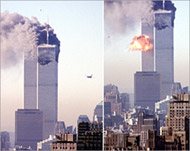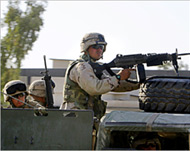Poll: Security issues to decide US election
Unlike every US presidential election in recent history, foreign-policy issues will be the dominant issue for most voters this November, according to a recent study released by the Pew Research Center for the People and the Press.

While many political experts had predicted the economy would be the driving force in the current race, the Pew survey found that 41% of Americans view international issues related to national security – particularly terrorism and the war in Iraq – as the most important problems facing the country.
Only 26% said the economy was their top priority.
Pew director Andrew Kohut said the poll reflected how deeply the 9/11 attacks changed the way American voters view politics and the world.
“For the first time since the Vietnam era, foreign affairs/national security looms larger than economic concerns in the presidential election,” Kohut said during an interview with the Council on Foreign Relations.
“The September 11 attacks have not only raised the stakes for Americans, but also created deep divisions of opinion about foreign policy and national security.”
Mixed prospects
Such results contain good news and bad news for both candidates, says Karlyn Bowman, a polling expert at the American Enterprise Institute.
“Kerry looks at it and says, ‘I’ve got some strengths’, and Bush looks at it and says, ‘I’ve got some strengths’,” Bowman said.
 |
|
The 9/11 attacks created deep |
The survey suggested that the next few months in Iraq will be critical to President Bush’s re-election prospects.
While more Americans still give Bush a slight edge over John Kerry when it comes to handling the “war on terrorism”, the two candidates are evenly matched on the question of who would do a better job handling the situation in Iraq, according to the Pew poll, conducted from 8 July 8 to 18 July among more than 2000 voters.
A Pew survey of public opinion taken from 5 August to 10 August found that 52% of the public disapprove of the way Bush is directing operations in Iraq and nearly 60% believe the administration still does not have a definitive plan for victory.
|
“Kerry looks at it and says, ‘I’ve got some strengths’, and Bush looks at it and says, ‘I’ve got some strengths'” Karlyn Bowman, polling expert, American Enterprise Institute |
Attitudes about Iraq remain split along partisan lines, with the American people “divided about whether the Iraq war was a good thing to do”, Kohut said.
“We find many people saying that the United States lost [international] respect and that this is a significant problem,” he said.
“On the other hand, we find almost as much support for pre-emptive war as we did a year ago, when Iraq was being judged a success. So we have this tension in public opinion.”
While a growing number of Republicans support the use of pre-emptive military action against US enemies in the war on terrorism, only 44% of Democrats support the Bush doctrine, down from 58% last year.
Loved or feared?
Further highlighting the partisan split, 62% of respondents, mainly Republicans, support an aggressive foreign policy, while 66% favour a more cautious stance on global issues.
Americans continue to disagree on whether it is important for the US to be loved or feared by the rest of the world, the poll found.
 |
|
Only 44% of Democrats support |
Reflecting a stance that would seem to favour the Kerry platform, nearly half of the public believes US foreign policy should take into account the needs of American allies, while nearly four in ten favour an approach based mainly on US national interests.
However, almost 90% of Americans say “taking measures to protect the US from terrorist attacks” should be a top priority, a view that plays into Bush’s political strength.
Such tension has made it difficult for political experts to determine which candidate has the advantage on foreign policy heading into the November election.
“We do not know what all of this means yet,” Bowman said.